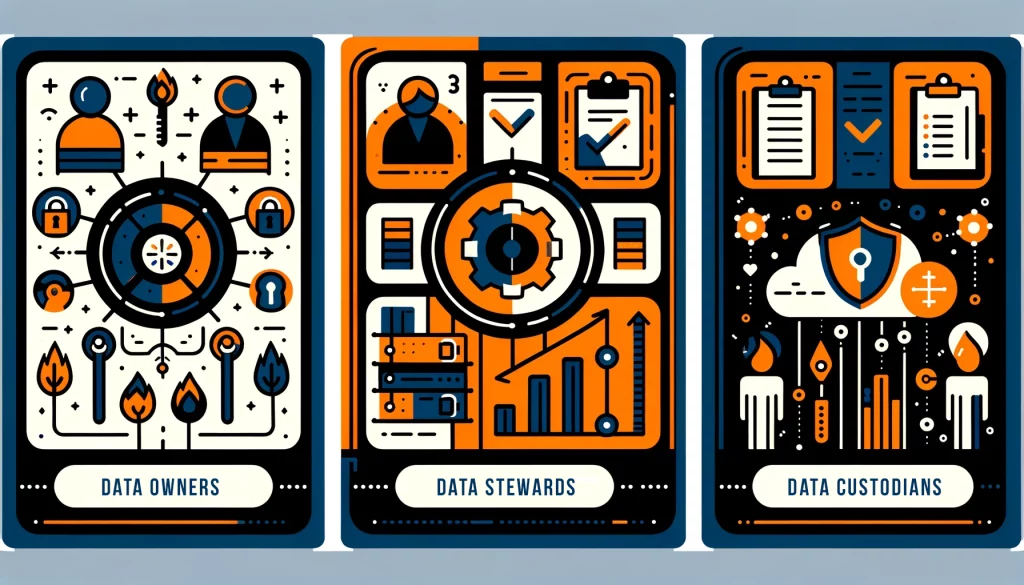
Roles and Responsibilities in Data Governance: Owners, Stewards, and Custodians

In today’s data-driven world, organizations are increasingly recognizing the value of their data assets. Understanding the main roles in data governance is important to effectively manage assets. The main roles are data owner, data steward, and data custodian.
A data owner is the person accountable for a dataset’s quality, access, and compliance. They have the authority to make decisions about how the data is used, shared, and protected across the organization.
Each role plays a crucial part in handling and maximizing the value of data assets. Understanding these roles is essential for successful data governance.
This article will discuss the roles and responsibilities that help make an organization’s data management strategy successful.
Why the Data Custodian Role Matters
The data custodian plays a critical role in protecting an organization’s data infrastructure. While Data Owners define access policies and Data Stewards maintain data quality, Data Custodians focus on implementing technical controls to enforce security, backup, and access requirements.
This role is especially important in regulated industries where compliance with standards like GDPR, HIPAA, or SOX is mandatory. Data Custodians ensure that only authorized users access data, logs are maintained for auditing, and systems remain secure against breaches or data loss.
Effective data governance depends on the strong collaboration between Data Custodians, Owners, and Stewards. Tools like DataSunrise can help Data Custodians enforce security policies, monitor activity, and support fine-grained access control across cloud and on-premises environments.
What Is a Data Owner and Why Does It Matter?
Data owners are important individuals who oversee the management of data in an organization. They are in charge of classifying, protecting, utilizing, and maintaining the integrity of one or more data sets.
They are responsible for ensuring that the organization’s data glossary is comprehensive and agreed upon by all stakeholders. A data owner creates systems to check the quality of data. They also report on the quality of data. Additionally, they create processes to deal with any data quality problems.
To fulfill their responsibilities, a data owner needs the authority to make necessary changes to workflows, practices, and infrastructure. They also require adequate resources to initiate actions for ensuring data quality, such as data cleansing and audits. Upper management positions typically include the data owner role based on these requirements.
Example: In a retail chain, the Head of Sales might be the data owner for customer data from sweepstakes. They are in charge of sales targets. They value making marketing campaigns successful. This makes them a good fit for deciding how to improve data quality and security.
Data Stewards: The Subject Matter Experts
Data stewards are subject matter experts with a thorough understanding of a particular data set. They ensure that they classify, protect, use properly, and maintain good quality of the data. They must follow the data governance standards set by the data owner.
The data owner chooses data stewards. They can have different backgrounds, like business, operations, IT, or project-specific roles.
Four distinct types of data stewards:
- Business Data Stewards
- Operational Data Stewards
- Technical Data Stewards
- Project Data Stewards
Individuals differentiate these roles based on their functional background within the organization. Several people need to work together to manage the same data and ensure they take good care of it.
For instance, in a factory, the Production Manager might choose different employees to be data stewards. Production Shift Supervisors may track material usage and output data. Maintenance Engineers could monitor machine performance data. A Quality Lead could oversee defect and rejection data.
Data owner, ensuring that the owner’s defined policies and quality standards are upheld across the organization.
Data Custodians: The Security Implementers
Unlike owners and stewards, Data Custodians are in charge of implementing and maintaining security controls for a specific data set. They make sure that they meet the requirements set by the Data Owner in the Data Governance Framework. They are often mistaken for Data Owners because they are responsible for storing and securing a data set. However, it’s important to note that storing data does not equate to ownership.
When it comes to Data Custodians — they are typically IT professionals who oversee the storage and security infrastructure for one or multiple data sets. They work closely with Data Owners and Stewards to make sure data is safe and accessible to authorized people.
In a retail chain, an IT administrator acts as the Data Custodian. They ensure that authorized staff can safely store customer data on a cloud server and access it.
The Importance of Clarity in Data Governance Roles
Every role needs to have clear tasks, specific data sets to manage, and guidelines for when to take action. Each role should have a set of defined tasks that they are responsible for. They should also have specific data sets that they are in charge of. Provide clear guidelines that specify when they can or must take action.
The data owner is responsible for data governance. Data stewards also have similar duties, but the ultimate responsibility lies with the data owner. Establish clear escalation matrices to address any issues that may arise.
Key Differences: Data Owner vs. Data Steward vs. Data Custodian
| Role | Primary Responsibility | Typical Background | Authority Level |
|---|---|---|---|
| Data Owner | Defines data policies, sets access rights, and ensures compliance | Business leaders, department heads | High (makes final decisions) |
| Data Steward | Maintains data quality, ensures standards are followed | Subject matter experts (business, IT, operations) | Moderate (executes owner’s policies) |
| Data Custodian | Implements technical controls and manages data storage/security | IT, infrastructure, database admins | Low to medium (executes, not policy-maker) |
Conclusion
Effective data governance is a team effort that requires the collaboration of data owners, data stewards, and data custodians. Organizations can improve how they handle their data assets by understanding the responsibilities of each role.
This will help them leverage the data for better analytics and business exploration. Ensuring clarity in the definitions of these roles is important. This will make it easier for everyone to understand their responsibilities and work together effectively.
Data alone doesn’t solve problems or add value. How we manage and use data makes a difference. Having a good system in place for managing data is important.
This system should include clear roles and responsibilities. This will help ensure that people see data as a valuable asset rather than a risk.
Ultimately, the data owner is the cornerstone of data governance—ensuring that information assets are aligned with business goals, well-governed, and available for decision-making when it matters most.
